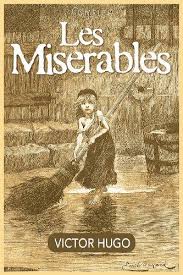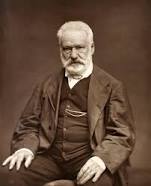Les Misérables Page #5
Les Misérables is a French historical novel by Victor Hugo, first published in 1862, that is considered one of the greatest novels of the 19th century. In the English-speaking world, the novel is usually referred to by its original French title.
Being, as he described himself with a smile, an ex-sinner, he had none of the asperities of austerity, and he professed, with a good deal of distinctness, and without the frown of the ferociously virtuous, a doctrine which may be summed up as follows:-- "Man has upon him his flesh, which is at once his burden and his temptation. He drags it with him and yields to it. He must watch it, check it, repress it, and obey it only at the last extremity. There may be some fault even in this obedience; but the fault thus committed is venial; it is a fall, but a fall on the knees which may terminate in prayer. "To be a saint is the exception; to be an upright man is the rule. Err, fall, sin if you will, but be upright. "The least possible sin is the law of man. No sin at all is the dream of the angel. All which is terrestrial is subject to sin. Sin is a gravitation." When he saw everyone exclaiming very loudly, and growing angry very quickly, "Oh! oh!" he said, with a smile; "to all appearance, this is a great crime which all the world commits. These are hypocrisies which have taken fright, and are in haste to make protest and to put themselves under shelter." He was indulgent towards women and poor people, on whom the burden of human society rest. He said, "The faults of women, of children, of the feeble, the indigent, and the ignorant, are the fault of the husbands, the fathers, the masters, the strong, the rich, and the wise." He said, moreover, "Teach those who are ignorant as many things as possible; society is culpable, in that it does not afford instruction gratis; it is responsible for the night which it produces. This soul is full of shadow; sin is therein committed. The guilty one is not the person who has committed the sin, but the person who has created the shadow." It will be perceived that he had a peculiar manner of his own of judging things: I suspect that he obtained it from the Gospel. One day he heard a criminal case, which was in preparation and on the point of trial, discussed in a drawing-room. A wretched man, being at the end of his resources, had coined counterfeit money, out of love for a woman, and for the child which he had had by her. Counterfeiting was still punishable with death at that epoch. The woman had been arrested in the act of passing the first false piece made by the man. She was held, but there were no proofs except against her. She alone could accuse her lover, and destroy him by her confession. She denied; they insisted. She persisted in her denial. Thereupon an idea occurred to the attorney for the crown. He invented an infidelity on the part of the lover, and succeeded, by means of fragments of letters cunningly presented, in persuading the unfortunate woman that she had a rival, and that the man was deceiving her. Thereupon, exasperated by jealousy, she denounced her lover, confessed all, proved all. The man was ruined. He was shortly to be tried at Aix with his accomplice. They were relating the matter, and each one was expressing enthusiasm over the cleverness of the magistrate. By bringing jealousy into play, he had caused the truth to burst forth in wrath, he had educed the justice of revenge. The Bishop listened to all this in silence. When they had finished, he inquired,-- "Where are this man and woman to be tried?" "At the Court of Assizes." He went on, "And where will the advocate of the crown be tried?" A tragic event occurred at D---- A man was condemned to death for murder. He was a wretched fellow, not exactly educated, not exactly ignorant, who had been a mountebank at fairs, and a writer for the public. The town took a great interest in the trial. On the eve of the day fixed for the execution of the condemned man, the chaplain of the prison fell ill. A priest was needed to attend the criminal in his last moments. They sent for the curé. It seems that he refused to come, saying, "That is no affair of mine. I have nothing to do with that unpleasant task, and with that mountebank: I, too, am ill; and besides, it is not my place." This reply was reported to the Bishop, who said, "Monsieur le Curé is right: it is not his place; it is mine." He went instantly to the prison, descended to the cell of the "mountebank," called him by name, took him by the hand, and spoke to him. He passed the entire day with him, forgetful of food and sleep, praying to God for the soul of the condemned man, and praying the condemned man for his own. He told him the best truths, which are also the most simple. He was father, brother, friend; he was bishop only to bless. He taught him everything, encouraged and consoled him. The man was on the point of dying in despair. Death was an abyss to him. As he stood trembling on its mournful brink, he recoiled with horror. He was not sufficiently ignorant to be absolutely indifferent. His condemnation, which had been a profound shock, had, in a manner, broken through, here and there, that wall which separates us from the mystery of things, and which we call life. He gazed incessantly beyond this world through these fatal breaches, and beheld only darkness. The Bishop made him see light. On the following day, when they came to fetch the unhappy wretch, the Bishop was still there. He followed him, and exhibited himself to the eyes of the crowd in his purple camail and with his episcopal cross upon his neck, side by side with the criminal bound with cords. He mounted the tumbril with him, he mounted the scaffold with him. The sufferer, who had been so gloomy and cast down on the preceding day, was radiant. He felt that his soul was reconciled, and he hoped in God. The Bishop embraced him, and at the moment when the knife was about to fall, he said to him: "God raises from the dead him whom man slays; he whom his brothers have rejected finds his Father once more. Pray, believe, enter into life: the Father is there." When he descended from the scaffold, there was something in his look which made the people draw aside to let him pass. They did not know which was most worthy of admiration, his pallor or his serenity. On his return to the humble dwelling, which he designated, with a smile, as his palace, he said to his sister, "I have just officiated pontifically." Since the most sublime things are often those which are the least understood, there were people in the town who said, when commenting on this conduct of the Bishop, "It is affectation." This, however, was a remark which was confined to the drawing-rooms. The populace, which perceives no jest in holy deeds, was touched, and admired him. As for the Bishop, it was a shock to him to have beheld the guillotine, and it was a long time before he recovered from it. In fact, when the scaffold is there, all erected and prepared, it has something about it which produces hallucination. One may feel a certain indifference to the death penalty, one may refrain from pronouncing upon it, from saying yes or no, so long as one has not seen a guillotine with one's own eyes: but if one encounters one of them, the shock is violent; one is forced to decide, and to take part for or against. Some admire it, like de Maistre; others execrate it, like Beccaria. The guillotine is the concretion of the law; it is called vindicate; it is not neutral, and it does not permit you to remain neutral. He who sees it shivers with the most mysterious of shivers. All social problems erect their interrogation point around this chopping-knife. The scaffold is a vision. The scaffold is not a piece of carpentry; the scaffold is not a machine; the scaffold is not an inert bit of mechanism constructed of wood, iron and cords.
Translation
Translate and read this book in other languages:
Select another language:
- - Select -
- 简体中文 (Chinese - Simplified)
- 繁體中文 (Chinese - Traditional)
- Español (Spanish)
- Esperanto (Esperanto)
- 日本語 (Japanese)
- Português (Portuguese)
- Deutsch (German)
- العربية (Arabic)
- Français (French)
- Русский (Russian)
- ಕನ್ನಡ (Kannada)
- 한국어 (Korean)
- עברית (Hebrew)
- Gaeilge (Irish)
- Українська (Ukrainian)
- اردو (Urdu)
- Magyar (Hungarian)
- मानक हिन्दी (Hindi)
- Indonesia (Indonesian)
- Italiano (Italian)
- தமிழ் (Tamil)
- Türkçe (Turkish)
- తెలుగు (Telugu)
- ภาษาไทย (Thai)
- Tiếng Việt (Vietnamese)
- Čeština (Czech)
- Polski (Polish)
- Bahasa Indonesia (Indonesian)
- Românește (Romanian)
- Nederlands (Dutch)
- Ελληνικά (Greek)
- Latinum (Latin)
- Svenska (Swedish)
- Dansk (Danish)
- Suomi (Finnish)
- فارسی (Persian)
- ייִדיש (Yiddish)
- հայերեն (Armenian)
- Norsk (Norwegian)
- English (English)
Citation
Use the citation below to add this book to your bibliography:
Style:MLAChicagoAPA
"Les Misérables Books." Literature.com. STANDS4 LLC, 2025. Web. 5 Feb. 2025. <https://www.literature.com/book/les_mis%C3%A9rables_13>.








Discuss this Les Misérables book with the community:
Report Comment
We're doing our best to make sure our content is useful, accurate and safe.
If by any chance you spot an inappropriate comment while navigating through our website please use this form to let us know, and we'll take care of it shortly.
Attachment
You need to be logged in to favorite.
Log In